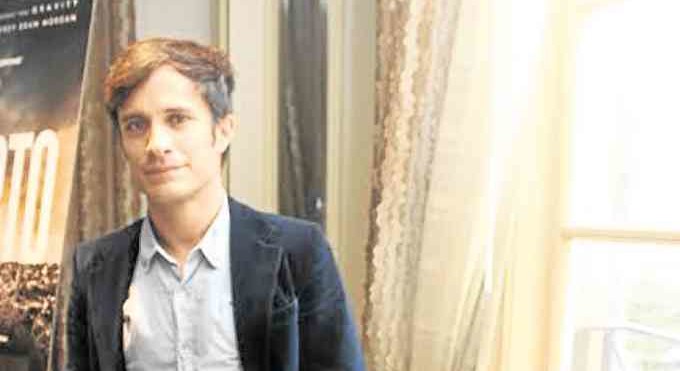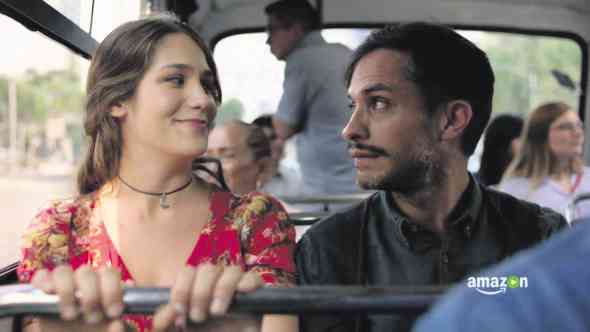LOS ANGELES—It’s a good time to be Gael Garcia Bernal. He plays Rodrigo, a brash orchestra conductor in Amazon Studios’ “Mozart in the Jungle,” for which he won his first Golden Globe (best actor in a TV series-comedy or musical) in January. In the show’s Season 3, he filmed in Venice with the beautiful Monica Bellucci playing an opera diva.
The son of actors who started acting when he was just a year old works almost nonstop in films. In “Desierto,” a drama about a group of people attempting to cross the border from Mexico into the US, he encounters a racist self-styled border patroller (Jeffrey Dean Morgan).
The timely film is written and directed by Jonas Cuaron, the son of Alfonso who coproduced with his brother, Carlos. The Cuaron (Alfonso also directed Gael in his “Y Tu Mama Tambien”) connection prompted the actor to quip that he will soon work with Alfonso’s two young kids.
The Guadalajara, Mexico native also topbills “Neruda” (he portrays an inspector hunting down Chilean award-winning poet Pablo Neruda); “Salt and Fire”; “You’re Killing Me Susana”; “Z” (yes, he will don Zorro’s mask) and “Si Tu Voyais Son Coeur.”
Excerpts from our chat with Gael, still boyish-looking at 37:
What was it like to work with Monica Bellucci in Venice? That is a mystery that I will never reveal (laughs). It was amazing. “Mozart in the Jungle” gives us so much pleasure to do. We all enjoy going into different adventures. In this third season, we went to Venice, to the land of opera.
Working there with Monica and Placido Domingo—it was a dream come true.
Monica is very talented, courageous, brave and mischievous. She’s like the best buddy you can have as an actor and she is a good companion. She does everything and goes for it in all ways.
You have worked with the Cuarons—Alfonso, his son Jonas, and his brother Carlos, who coproduced “Desierto.” How are they similar? Yeah, I worked with the whole family now. I see myself as a bastard son in a sense (laughs). I am OK with that role and I have no problem. Yes, it is very funny what Alfonso and Jonas have in common because they look at the video the same way. Whenever they have the clamshell (camera), they look at it in the same way. And whenever they look up, they have the same expression.
Also, how can I put it that it sounds nice—let’s say they have the grace of a gazelle when they are going up the mountain. It is really funny to see them climb. In the Cuaron family, you can actually see the thought process when they are climbing up the mountain. It’s really funny because you are like, I can’t believe these guys take forever (laughs)!
When we were shooting “Desierto,” there were points where we had to go down rocks. To see Jonas’ expression of fear, it was really fantastic! But it was very similar to Alfonso’s and Carlos’.
They have a great sense of humor and, of course, they are incredibly talented and loving.
Are there other members of the Cuaron family that you are waiting to work with? Well, they are still very little but Alfonso has a son and a daughter (laughs). Maybe one day, we will do something.
“Desierto” is very timely because it covers the issues of immigration and border crossings as Donald Trump proposes the construction of a border wall between the US and Mexico. Well, whew! Man, it is unfortunately timely, no? We are still talking about immigration for election purposes; it is used as the cheapest card.
We have to understand that immigration is a natural phenomenon and it is the reason why humans still exist on earth. People who have been paying their taxes for 20 years, have been living here and making the community and the society better—all of a sudden are criminalized.
We are criminalizing the wrong people. We reached this point of shame when a candidate for US president actually bases all his narrative of being the next president on demonizing and speaking bad, and building this rhetoric of hate against Mexicans, Muslims, Chinese and, like he says, Latino Hispanics, which shows he has no idea. Or Hispanic Latinos—he arranges it depending on what he is thinking.
“Desierto” captures the nightmare of this rhetoric that has been seen in the world many times. What happens when this rhetoric is in place and when this narrative is established—you only need one person pulling the trigger for hell to break loose. That’s how genocide and civil war are started.
How important is music to you, especially now that you are in “Mozart in the Jungle”? Recently, for example, I had a great opportunity to see the Simon Bolivar Orchestra, conducted by Gustavo Dudamel. They were playing “Turangalila” by Messiaen. It’s a fantastic symphony that has 10 movements. We also did that piece in the third season of “Mozart in the Jungle.”
So I am getting this wonderful opportunity and privilege to be able to experience music and to feel that it is part of me. That is the best thing that happened to me with “Mozart…”—my appreciation and grasp of music have increased.
Can you talk about your character in “Neruda”? I play the policeman (Oscar Peluchonneau) who chases Neruda. He also acts as a narrator. Basically, he represents the fascist mentality that started to persecute communists in Chile and around the world. There is a transformation of the character that goes on to another dimension which is a very difficult thing to explain, actually.
Are you going ahead with “Zorro”? Oh yeah, we are talking about it. In between these interviews, I am talking with Jonas all the time about it.
You have been acting since you were a year old. That’s amazing. I love working as an actor. I have so much fun doing it. I wish I will never stop doing it. I get so much from acting and I learn a lot.
I see it still as like maybe Lionel Messie (pro footballer) still sees it, like a game. It’s a game that you play and you have fun doing it.



